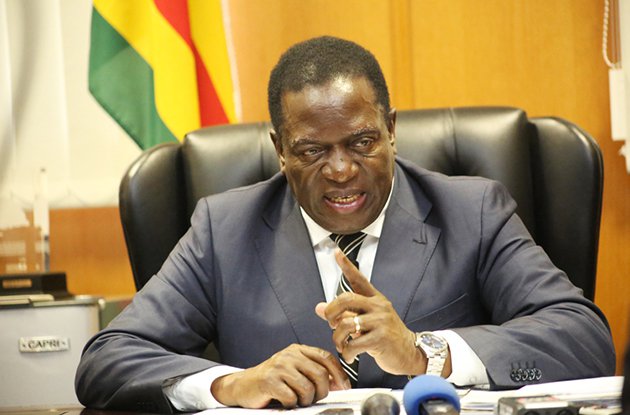News / National
Mnangagwa signs Zimbabwe's 'Logan Act' into fully fledged law
14 Jul 2023 at 17:41hrs |
1 Views

President Emmerson Mnangagwa has signed a law that prohibits citizens from criticising the government, defying wide appeals for him to spare the nation of a piece of legislation viewed repressive by opponents.
President Mnangagwa's assent to the Criminal Law (Codification and Reform) Amendment Act, 2023(No.10 of 2023) commonly referred to as the Patriotic Bill was announced in a government notice published this Friday.
The much-resented law criminalises "willfully injuring the sovereignty and national interests of Zimbabwe" by citizens calling for military intervention and sanctions against the country.
"The following laws, which were assented to by His Excellency the President, are published in terms of section 131(6)(a) of the Constitution of Zimbabwe; 1. Criminal Law (Codification and Reform) Amendment Act, 2023 (No.10 of 2023).
"2 – Labour Amendment Act, 2023 (No 11 of 2023)," wrote Misheck Sibanda, chief secretary to the President and Cabinet.
Opposition Citizens Coalition for Change (CCC) spokesperson Fadzayi Mahere condemned the signing into law of the ‘unconstitutional' Patriotic Bill.
"The enactment confirms that Zimbabwe is a full-blown dictatorship run by a regime worse than Robert Mugabe.
"In the new Zimbabwe, unjust laws will be repealed. We will deliver freedom," she posted on her Twitter account.
When the law passed both houses of the parliament weeks ago, human rights lobby groups, activists and opposition parties raised concerns the law was going to be abused by the current administration to muzzle freedom of speech.
The law criminalises citizens and residents of Zimbabwe who, by recourse to foreign countries, seek to implement measures that undermine Zimbabwe's sovereignty, dignity and independence as a nation.
The law lists offences such as "wilfully injuring the sovereignty and national interest of Zimbabwe" for active participation by Zimbabweans in meetings inside and outside Zimbabwe on issues of military intervention, subverting/upsetting/overthrowing or overturning the constitutional government, or on economic sanctions and trade boycotts."
President Mnangagwa's assent to the Criminal Law (Codification and Reform) Amendment Act, 2023(No.10 of 2023) commonly referred to as the Patriotic Bill was announced in a government notice published this Friday.
The much-resented law criminalises "willfully injuring the sovereignty and national interests of Zimbabwe" by citizens calling for military intervention and sanctions against the country.
"The following laws, which were assented to by His Excellency the President, are published in terms of section 131(6)(a) of the Constitution of Zimbabwe; 1. Criminal Law (Codification and Reform) Amendment Act, 2023 (No.10 of 2023).
"2 – Labour Amendment Act, 2023 (No 11 of 2023)," wrote Misheck Sibanda, chief secretary to the President and Cabinet.
Opposition Citizens Coalition for Change (CCC) spokesperson Fadzayi Mahere condemned the signing into law of the ‘unconstitutional' Patriotic Bill.
"The enactment confirms that Zimbabwe is a full-blown dictatorship run by a regime worse than Robert Mugabe.
"In the new Zimbabwe, unjust laws will be repealed. We will deliver freedom," she posted on her Twitter account.
When the law passed both houses of the parliament weeks ago, human rights lobby groups, activists and opposition parties raised concerns the law was going to be abused by the current administration to muzzle freedom of speech.
The law criminalises citizens and residents of Zimbabwe who, by recourse to foreign countries, seek to implement measures that undermine Zimbabwe's sovereignty, dignity and independence as a nation.
The law lists offences such as "wilfully injuring the sovereignty and national interest of Zimbabwe" for active participation by Zimbabweans in meetings inside and outside Zimbabwe on issues of military intervention, subverting/upsetting/overthrowing or overturning the constitutional government, or on economic sanctions and trade boycotts."
Source - zimlive
Join the discussion
Loading comments…































